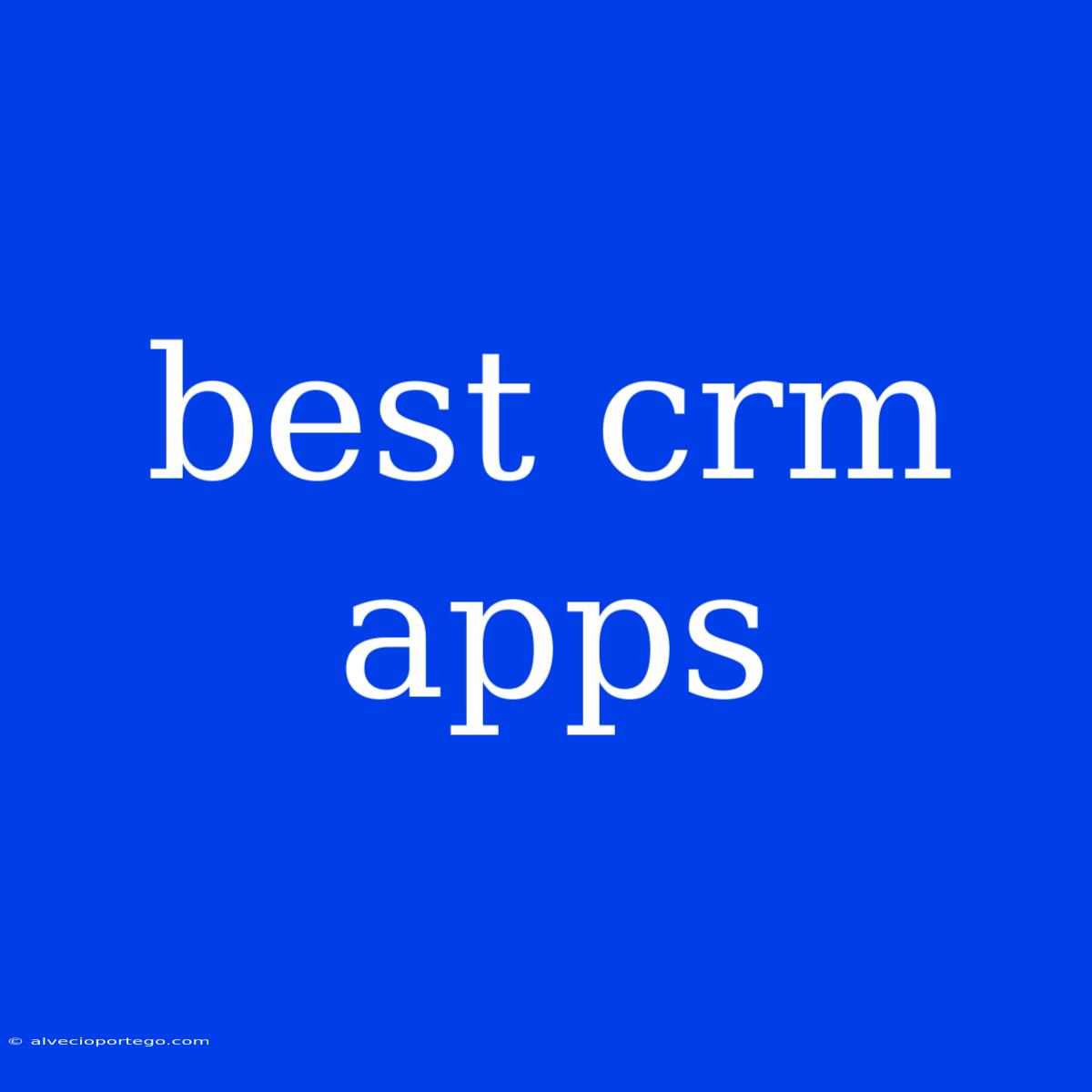Best CRM Apps for Every Business Size
A Customer Relationship Management (CRM) system is an essential tool for businesses of all sizes. It helps you manage customer interactions, track sales, analyze data, and ultimately, improve your customer relationships.
With so many CRM options available, choosing the right one can be overwhelming. To help you navigate the options, we've compiled a list of the best CRM apps, categorized by business size and features:
For Small Businesses
1. Zoho CRM:
- Best for: Startups and small businesses with limited budgets.
- Key Features: Easy-to-use interface, affordable pricing plans, wide range of features including sales automation, marketing automation, and customer support tools.
- Pros: Affordable, feature-rich, mobile-friendly.
- Cons: Some features may be overkill for very small businesses.
2. HubSpot CRM:
- Best for: Businesses looking for a free CRM with a strong emphasis on marketing automation.
- Key Features: Free plan with a generous set of features, marketing automation tools, social media integration.
- Pros: Free, user-friendly, great for marketing-focused businesses.
- Cons: Limited functionality in the free plan compared to paid plans.
3. Pipedrive:
- Best for: Sales-driven businesses looking for a visual and intuitive sales pipeline management system.
- Key Features: Focus on sales pipelines, customizable dashboards, activity tracking.
- Pros: Easy to use, excellent for sales teams, clear visual representation of progress.
- Cons: Limited marketing automation features compared to other CRMs.
For Medium-Sized Businesses
1. Salesforce:
- Best for: Established businesses with a need for advanced functionality and customization.
- Key Features: Extensive customization options, powerful reporting and analytics, robust automation capabilities.
- Pros: Highly scalable, comprehensive feature set, strong customer support.
- Cons: Expensive, complex to set up and learn, requires dedicated IT resources.
2. Microsoft Dynamics 365:
- Best for: Businesses using Microsoft Office 365 and looking for a tightly integrated CRM solution.
- Key Features: Integration with Microsoft products, robust reporting and analytics, good customer support.
- Pros: Seamless integration with Microsoft products, advanced automation features, customizable.
- Cons: Can be expensive, requires a significant learning curve.
3. NetSuite:
- Best for: Businesses looking for a comprehensive suite of business applications including CRM, ERP, and financial management.
- Key Features: Integrated platform, robust financial reporting, automation capabilities.
- Pros: All-in-one solution, strong financial management features, good scalability.
- Cons: Can be expensive, complex to implement and maintain.
For Large Enterprises
1. Oracle Siebel:
- Best for: Large enterprises with complex business processes and a need for highly customizable CRM solutions.
- Key Features: Extensive customization capabilities, robust security features, advanced analytics.
- Pros: Highly scalable, advanced customization options, strong data management.
- Cons: Expensive, requires significant IT resources, complex to implement.
2. SAP CRM:
- Best for: Large enterprises with global operations and a need for a comprehensive CRM solution.
- Key Features: Strong global support, robust reporting and analytics, integration with SAP ERP systems.
- Pros: Global reach, comprehensive functionality, high security standards.
- Cons: Expensive, complex to implement, requires dedicated IT resources.
3. SugarCRM:
- Best for: Large enterprises looking for a flexible and open-source CRM solution.
- Key Features: Open-source platform, customizable, extensive integration capabilities.
- Pros: Flexible and customizable, strong community support, cost-effective for large deployments.
- Cons: Requires technical expertise for implementation and maintenance.
Choosing the Right CRM for Your Business
Ultimately, the best CRM app for you depends on your specific needs and budget. Consider these factors when making your decision:
- Business Size: Choose a CRM that can scale with your business growth.
- Budget: Set a budget and choose a CRM that fits your financial constraints.
- Features: Identify the specific features that are most important to you.
- Integration: Consider how the CRM will integrate with your existing systems.
- Ease of Use: Choose a CRM that is intuitive and user-friendly.
By carefully evaluating your needs and considering these factors, you can choose the best CRM app to streamline your customer interactions and drive your business forward.

